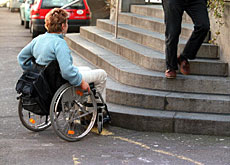Swiss reject improved rights for disabled

Swiss voters have thrown out a proposal to give the country's 700,000 disabled immediate access to public buildings.
The high cost of improving access is thought to have persuaded voters to reject the initiative.
More than 62 per cent of voters followed the government’s recommendations and voted against the proposal.
The vote had been expected to be a close one, with some analysts predicting that the financial argument could lose out to the moral one for giving the disabled equal rights in society.
Currently, less than 30 per cent of buildings across Switzerland are accessible to the disabled.
The initiative also called for disabled rights to be enshrined in the constitution.
Disappointment
The disabled movement said it was disappointed with the result.
Peter Wehrli, director of the centre for independent living in Zurich, who is himself disabled, said it was a great shame for Switzerland and represented a setback for the Swiss disability lobby.
He added that although he could see that the economic situation had played its part in the outcome, he believed there were other reasons for the proposal’s rejection.
“I’m convinced that behind the economic argument there is an issue of racism,” Wehrli told swissinfo.
“I think it’s the same situation as with women’s right to vote. It took Switzerland 50 years longer than most other European countries to recognise women as citizens and the same is happening with disabled people,” he added.
But he said the disability movement had learned a lot from the experience and would keep lobbying for its cause.
“We’ll have another people’s initiative and perhaps another one. It’ll take another fight and that’s very sad for us, but the fight will go on,” Wehrli said.
Money matters
But the government, which opposed the motion, maintained that a “yes” vote would be too expensive both at a federal and cantonal level.
Luzius Mader from the justice ministry had earlier estimated that the financial impact of the initiative would cost the transport sector up to SFr4 billion ($3 billion).
He said that under a new law due to come into force next year, which phases in changes, the costs could run to SFr600 million.
“The difference occurs because the initiative requires guaranteeing access to public transport immediately, whereas the law allows for a transition period,” said Mader.
Under the new law, transport companies would have up to 20 years to make changes to their buildings, rolling stock and vehicles.
It would also guarantee the disabled access to all new public buildings.
Not far enough
But supporters of the disabled access initiative argue that the new law does not go far enough, especially as it does not apply to existing buildings unless they are being renovated.
Mark Suter, a wheelchair-bound parliamentarian who is in favour of the motion, rejected claims that the costs would be too high and insisted that the country’s disabled should have the same rights to mobility and access as the rest of the population.
“We don’t want to trade off human rights against costs,” he told swissinfo ahead of Sunday’s the vote.
The government, meanwhile, insisted that a “no” vote was not a vote against the disabled.
The justice minister, Ruth Metzler, said in the run-up to the ballot that the government and parliament were in favour of the law, but the initiative would have gone too far.
swissinfo, Isobel Johnson
The initiative aimed to force the government to ensure immediate access to public buildings and services for the country’s 700,000 disabled.
But the government said that a “yes” vote would be too expensive at federal and cantonal levels.
A new law, which phases in disabled rights, comes into force next year.
But supporters of the disabled access initiative argued that the new law does not go far enough.

In compliance with the JTI standards
More: SWI swissinfo.ch certified by the Journalism Trust Initiative










You can find an overview of ongoing debates with our journalists here . Please join us!
If you want to start a conversation about a topic raised in this article or want to report factual errors, email us at english@swissinfo.ch.